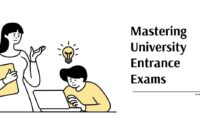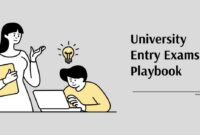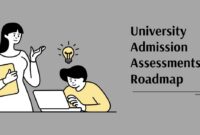Sarah, a bright 18-year-old from Manchester, sits at her desk surrounded by university brochures, application forms, and her laptop showing countless admission requirements. She dreams of studying medicine at Oxford but feels overwhelmed by the complex university admission assessments steps ahead of her. Sound familiar? You’re not alone in this journey.
Getting into your dream European university doesn’t have to feel like solving a puzzle with missing pieces. The college admission process steps might seem complicated at first, but once you understand the system, you’ll navigate it with confidence. This complete guide breaks down everything you need to know about university entry assessment stages, making your path to higher education clear and achievable.
Whether you’re aiming for Cambridge, the Sorbonne, or any prestigious European institution, understanding the academic evaluation steps will give you a significant advantage. Let’s walk through this journey together, step by step, so you can focus on what matters most – securing your place at the university of your dreams.
Understanding the Foundation of University Admissions
The higher education admission procedures in Europe follow a structured approach that varies slightly between countries but maintains core similarities. Think of it as a recipe – while ingredients might differ, the basic cooking process remains the same.
1. Academic Requirements Assessment
Your academic journey starts with meeting the basic entry requirements. European universities typically evaluate your secondary education qualifications, looking at both your grades and the subjects you’ve studied. For UK universities, you’ll need A-levels or equivalent qualifications, while other European countries might require their national certificates or International Baccalaureate.
Most universities set minimum grade requirements, but don’t worry if you’re slightly below the typical offer. Many institutions consider your overall profile, including extracurricular activities and personal circumstances. The key is demonstrating your potential and commitment to your chosen field of study.
Your subject choices matter significantly. If you’re applying for engineering, universities expect strong mathematics and science backgrounds. For literature programs, they’ll look for excellent language skills and analytical thinking. Research your target universities early to ensure you’re taking the right subjects.
2. Language Proficiency Verification
European universities place enormous emphasis on language skills, especially if you’re studying in a non-native language. English-taught programs typically require IELTS or TOEFL scores, while programs in other languages need specific language certificates.
Don’t underestimate the importance of language preparation. Even if you’re confident in your abilities, formal test preparation can significantly improve your scores. Many students are surprised by the specific skills these tests evaluate, particularly academic writing and listening comprehension.
Consider taking language tests early in your application timeline. This gives you time to retake them if needed and reduces stress during the busy application period. Remember, some universities accept alternative evidence of language proficiency, such as previous education in the target language.
3. Standardized Test Performance
Many European universities require standardized tests as part of their university selection steps. These might include subject-specific tests, general aptitude assessments, or program-specific evaluations. The type of test depends on your chosen field and target university.
For competitive programs like medicine or law, specialized entrance exams are common. These tests evaluate not just your knowledge but also your analytical thinking, problem-solving abilities, and suitability for the profession. Understanding the format and content of these tests early in your preparation is crucial.
Practice makes perfect with standardized tests. Familiarize yourself with the test format, timing, and question types. Many universities provide sample questions or past papers, which are invaluable resources for your preparation.
The Application Process Journey
The college application process represents the heart of your university admission journey. This phase requires careful planning, attention to detail, and strategic thinking about how to present yourself as the ideal candidate.
4. Personal Statement Development
Your personal statement is your chance to speak directly to the admissions committee. This document should tell your story, explain your motivations, and demonstrate why you’re perfect for their program. Think of it as a conversation with the admissions team where you can showcase your personality and passion.
Start writing your personal statement early, giving yourself time to draft, revise, and perfect it. Focus on specific examples that demonstrate your skills and interests rather than making general statements. Show, don’t just tell, why you’re committed to your chosen field of study.
Remember that different universities might have varying requirements for personal statements. Some want specific formatting, word counts, or focus areas. Read each university’s guidelines carefully and tailor your statement accordingly.
5. Reference Letter Coordination
Strong reference letters can significantly boost your application. These letters provide external validation of your abilities and potential from teachers, employers, or mentors who know you well. The key is choosing referees who can speak specifically about your relevant skills and experiences.
Approach potential referees early, giving them plenty of time to write thoughtful, detailed letters. Provide them with information about the programs you’re applying to, your personal statement, and specific points you’d like them to address. This helps them write more targeted and effective recommendations.
Maintain good relationships with your referees throughout the process. Keep them updated on deadlines and provide any additional information they might need. A well-informed referee can write a much stronger letter than someone working with limited information.
6. Portfolio and Supplementary Materials
Certain programs require additional materials beyond standard application documents. Art programs might need portfolios, music programs could require audition recordings, and research-focused programs might want examples of your academic work.
Start preparing these materials early, as they often take significant time to compile and perfect. For creative portfolios, show range and progression in your work. For academic samples, choose pieces that demonstrate your analytical thinking and writing abilities.
Quality trumps quantity when it comes to supplementary materials. It’s better to submit fewer, high-quality pieces than many mediocre ones. Each item should serve a specific purpose in demonstrating your suitability for the program.
Assessment and Evaluation Stages
The admission test stages vary significantly between universities and programs. Understanding what to expect helps you prepare effectively and reduces anxiety during the actual assessment period.
7. Written Examination Preparation
Many European universities use written examinations as part of their campus entry procedures. These tests might cover subject-specific knowledge, general reasoning abilities, or a combination of both. The format can range from multiple-choice questions to essay-based assessments.
Effective preparation involves understanding the test structure, practicing with past papers, and developing time management strategies. Don’t just focus on content knowledge – work on your test-taking skills, including how to approach different question types and manage your time effectively.
Consider forming study groups with other applicants. Collaborative learning can help you understand difficult concepts and provides moral support during the stressful preparation period. Just remember that you’re ultimately competing for limited places, so balance cooperation with individual preparation.
8. Interview Assessment Preparation
University interviews can feel intimidating, but they’re simply conversations about your interests, motivations, and suitability for the program. Admissions committees use interviews to get to know you beyond your written application and assess your communication skills.
Prepare by researching common interview questions and practicing your responses. However, avoid memorizing scripts – interviews should feel natural and conversational. Focus on being able to discuss your experiences, goals, and reasons for choosing the program confidently and enthusiastically.
Mock interviews with teachers, family members, or friends can be incredibly helpful. They help you practice articulating your thoughts clearly and managing interview nerves. Record yourself if possible to identify areas for improvement in your presentation and communication style.
9. Practical Assessment Components
Some programs include practical assessments to evaluate hands-on skills relevant to the field of study. Medical programs might include practical stations, engineering programs could have problem-solving exercises, and language programs might assess conversational abilities.
Understanding the format and expectations of practical assessments is crucial for effective preparation. Contact current students or program coordinators for insights into what these assessments involve. Many universities also provide sample questions or practice scenarios.
Don’t neglect the importance of staying calm and focused during practical assessments. These evaluations often test not just your knowledge but also your ability to perform under pressure. Practice relaxation techniques and develop strategies for managing assessment anxiety.
Timeline and Strategic Planning
The academic entry assessment guide wouldn’t be complete without discussing timing and strategic planning. Success in university admissions often depends as much on when you do things as what you do.
10. Application Deadline Management
European universities have varying application deadlines, and missing them can end your chances regardless of how qualified you are. Create a comprehensive calendar that includes all relevant deadlines for each university you’re considering, including early application dates that might offer advantages.
Some universities operate on rolling admissions, evaluating applications as they receive them. For these institutions, applying early can provide significant advantages. Others have fixed deadlines but offer early decision options that can increase your chances of acceptance.
Don’t wait until the last minute to submit applications. Technical problems, missing documents, or other unexpected issues can derail last-minute submissions. Aim to complete applications at least a week before deadlines to allow time for problem-solving if needed.
11. Financial Planning and Scholarship Applications
Understanding the financial aspects of university education is crucial for making informed decisions. European universities have different fee structures, and scholarship opportunities vary widely between institutions and programs.
Research scholarship opportunities early in your planning process. Many scholarships have earlier deadlines than general admissions, and some require separate applications with additional requirements. Merit-based scholarships often consider your entire academic profile, while need-based options focus on financial circumstances.
Don’t overlook smaller, local scholarship opportunities. While they might not cover all expenses, multiple smaller scholarships can add up to significant financial support. Professional organizations, community groups, and local businesses often offer scholarships that receive fewer applications than major national programs.
12. Alternative Pathway Planning
Not everyone gets accepted to their first-choice university on their first attempt. Having backup plans and alternative pathways can help you achieve your educational goals even if your initial applications aren’t successful.
Consider applying to a range of universities with different admission requirements and competitiveness levels. This approach, often called creating a “safety net,” ensures you have options regardless of how competitive the application cycle becomes.
Foundation courses, gap year programs, or starting at community colleges can provide alternative routes to your desired university. Many European institutions have transfer agreements or pathways that allow students to join degree programs after completing preliminary studies elsewhere.
The university admission assessments roadmap provides additional strategic insights for planning your application timeline effectively.
Maximizing Your Success Potential
The university enrollment process steps require strategic thinking about how to present yourself as the strongest possible candidate. Success comes from understanding what admissions committees value and aligning your application accordingly.
Excellence in academics remains the foundation of strong applications, but European universities increasingly value well-rounded candidates. Demonstrate leadership, community involvement, and personal growth through your experiences and activities.
Research each university’s specific culture and values. What makes their program unique? How do they describe their ideal students? Tailoring your application to show alignment with their specific mission and values can significantly strengthen your candidacy.
For comprehensive strategies on excelling in entrance examinations, explore our detailed guide on mastering university entrance exams. Additionally, our university entry exams playbook offers proven strategies for examination success.
Moving Forward with Confidence
Understanding university admission assessments steps transforms what initially seems overwhelming into a manageable, structured process. Like Sarah from our opening story, you now have the knowledge to navigate the college admission process steps with confidence and strategic thinking.
Remember that admission to European universities is competitive, but thousands of students successfully navigate this process each year. Your academic achievements, personal experiences, and unique perspective all contribute to your candidacy. The key is presenting these elements effectively through the various assessment stages.
Success in the higher education admission procedures requires preparation, persistence, and patience. Start early, stay organized, and don’t hesitate to seek help when needed. University admissions offices, school counselors, and educational consultants are valuable resources throughout your journey.
Your university education represents an investment in your future, and the effort you put into the application process reflects your commitment to academic excellence. Approach each step with enthusiasm and confidence, knowing that you’re building the foundation for your future career and personal growth.
The academic evaluation steps might seem complex, but they’re designed to identify students who will thrive in university environments. By understanding and preparing for each component, you’re already demonstrating the qualities European universities value most: dedication, strategic thinking, and commitment to excellence.



